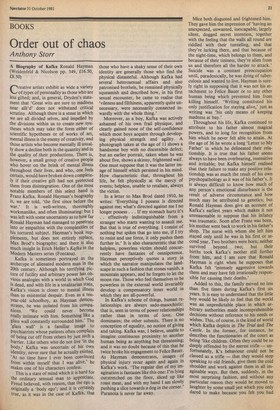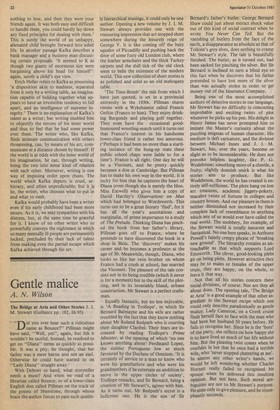BOOKS
Order out of chaos
Anthony Storr
A Biography of Kafka Ronald Hayman (Weidenfeld & Nicolson pp. 349, £16.50, £8.50) reative artists exhibit as wide a variety of types of personality as those who are less gifted; and, in general, Dryden's statement that 'Great wits are sure to madness near alli'd' does not withstand critical scrutiny. Although there is a sense in which we are all divided selves, and impelled by the divisions within us to create new syntheses which may take the form either of scientific hypotheses or of works of art, mental illness is the enemy of creativity, and those artists who become mentally ill usually show a decline both in the quantity and in the quality of their productions. There is, however, a small group of creative people who hover on the brink of mental illness throughout their lives, and who, one feels certain, would have broken down completely if their creative gift had not protected them from disintegration. One of the most notable members of this select band is Franz Kafka. Ronald Hayman's biography is, we are told, 'the first since before the war.' It is well-written, thoroughly workmanlike, and often illuminating: but I was left with some uncertainty as to how far Ronald Hayman had managed to penetrate into or empathise with the complexities of his tortured subject. Hayman's book supplements, but does not entirely replace, Max Brod's biography; and there is also much insight in Erich Heller's Kafka in the Modern Masters series (Fontana).
Kafka is sometimes portrayed as the archetype of alienated modern man in the 20ib century. Although his terrifying picture of futility and arbitrary power has obvious analogies with a world in which God is dead, and with life in a totalitarian state, Kafka's vision is closer to mental illness than to existential despair. Even as a tenYear-old schoolboy, as Hayman demonstrates, he was isolated from his companions. 'We could never become really intimate with him. Something like a glass wall constantly surrounded him.' The 'glass wall' is a familiar image to Psychiatrists whose patients often complain of being cut off from others by just such a barrier. Like others who do not live 'in the body,' Kafka was uncertain of his own identity, never sure that he actually existed. 'At no time have I ever been convinced from within myself that I was alive,' he makes one of his characters confess.
This is a state of mind which it is hard for the ordinary sensual man to appreciate. Freud believed, with reason, that the ego is originally a 'body ego'; and it is certainly true, as it was in the case of Kafka, that those who have a shaky sense of their own identity are generally those who find the physical distasteful. Although Kafka had several heterosexual affairs and also patronised brothels, he remained physically squeamish and described how, in his first sexual encounter, he came to realise that 'vileness and filthiness, apparently quite unnecessary, were necessarily connected inwardly with the whole thing.'
Moreover, as a boy, Kafka was actively ashamed of his own frail physique, and clearly gained none of the self-confidence which most boys acquire through developing physical strength and agility. A photograph taken at the age of 11 shows a handsome boy with no discernible defect; but an earlier portrait, taken when he was about five, shows a skinny, frightened waif. One must suppose that it was the latter image of himself which persisted in his mind. How characteristic that, throughout his life, he felt physically at the mercy of events; helpless, unable to retaliate, always the victim.
In a letter to Max Brod dated 1910, he writes: 'Everything I possess is directed against me; what's directed against me I no longer possess . . . If my stomach hurts it's . . effectively indistinguishable from a stranger who starts wanting to assault me. But that is true of everything. I consist of nothing but spikes that go into me, if I try to resist and use force, it only pushes them further in.' It is also characteristic that the helpless, powerless victim should concurrently have fantasies of omnipotence. Hayman perceptively quotes a story in which the narrator manipulates the landscape in such a fashion that stones vanish, a mountain appears, and he forgets to let the moon rise. Those who feel themselves to be powerless in the external world invariably develop a compensatory inner world in which they are all-powerful.
In Kafka's scheme of things, human relationships are always sado-masochistic: that is, seen in terms of power relationships rather than in terms of love. One dominates; the other submits. There is no conception of equality, no notion of giving and taking. Kafka was, I believe, unable to imagine continuous proximity to another human being as anything but threatening; and it was no doubt because of this that he twice broke his engagement to Felice Bauer. As Hayman demonstrates, images of physical injury recur again and again. in Kafka's work. 'The regular diet of my imagination is fantasies like this one: I'm lying outstretched on the floor, sliced up like roast meat, and with my hand I am slowly pushing a slice towards a dog in the corner.' Paranoia is never far away. Mice both disgusted and frightened him. They gave him the impression of 'having an unexpected, unwanted, inescapable, largely silent, dogged secret intention, together with the feeling that the walls all round are riddled with their tunneling, and that they're lurking there, and that because of the night-time, which belongs to them, and because of their tininess, they're alien from us and therefore all the harder to attack.' Suicide was a constant preoccupation until, paradoxically, he was dying of tuberculosis and wanted to live. Hayman is surely right in supposing that it was not his attachment to Felice Bauer or to any other human being which prevented him from killing himself. `Writing constituted his only justification for staying alive,' just as writing was 'his only means of keeping madness at bay.'
Throughout his life, Kafka continued to attribute to his father almost magical powers, arid to long for recognition from him which he never felt able to attain. At the age of 36 he wrote a long 'Letter to My Father' in which he delineated their relationship. It is true that his father seems always to have been overbearing, insensitive and irritable; but Kafka himself realised that their failure to make any positive relationship was as much the result of his own psychopathology as it was of his father's. It is always difficult to know how much of any person's emotional disturbance is the result of adverse circumstance and how much may be attributed to genetics; but Ronald Hayman does give an account of Kafka's earliest years which makes it not unreasonable to suppose that his infancy was traumatic. Soon after Franz was born, his mother went back to work in his father's shop. The nurse with whom she left him stayed only until he was in his first or second year. Two brothers were born; neither survived beyond two; but their births took Kafka's mother still further from him, and I am sure that Ronald Hayman is right when he supposes that Kafka felt 'intensely aggressive towards them and may have felt irrationally responsible for causing their deaths.'
Added to this, the family moved no less than five times during Kafka's first six years. It is easy to understand that the little boy would be likely to feel that the world was an unpredictable place in which arbitrary authorities made incomprehensible decisions without reference to his needs or wishes. This, of course, is the kind of world which Kafka depicts in The Trial and The Castle. In the former, for instance, he describes the functionaries of the court as being 'like children. Often they could be so deeply offended by the merest trifle — unfortunately, K's behaviour could not be classed as a trifle — that they would stop speaking to old friends, give them the cold shoulder and work against them in all imaginable ways. But then, suddenly, in the most surprising fashion, and without any particular reason they would be moved to laughter by some small jest which you only dared to make because you felt you had nothing to lose, and then they were your friends again. It was both easy and difficult to handle them, you could hardly lay down any fixed principles for dealing with them.' This is surely the world of an unhappy, alienated child brought forward into adult life. In another passage Kafka describes a bank manager and a business man discussing certain proposals. 'It seemed to K as though two giants of enormous size were bargaining above his head for himself': again, surely a child's eye view.
Erich Heller refers to Kafka as possessing 'a disposition akin to madness, separated from it only by a writing table, an imagination capable of holding together what appears to have an irresistible tendency to fall apart, and an intelligence of supreme integrity.' There is no explanation of Kafka's talent as a writer; but writing enabled him to objectify the terrors of his inner world and thus to feel that he had some power over them. The writer who, like Kafka, finds intimate communication with others threatening, can, by means of his art, communicate at a distance chosen by himself. If the world is at odds with the inner world of his imagination, he can, through writing, bring the two into some kind of relation with each other. Moreover, writing is one way of imposing order upon chaos. The world which Kafka depicts is cruel, arbitrary, and often unpredictable; but it is he, the writer, who chooses what to put in and what to omit.
Kafka would probably have been a writer even if his early childhood had been more secure. As it is, we may sympathise with his distress, but, at the same time be grateful for it. I know of no other writer who so powerfully conveys the nightmare in which so many mentally ill people are permanently locked, precluded by their lack of talent from making even the partial escape which Kafka achieved through his art.







































 Previous page
Previous page